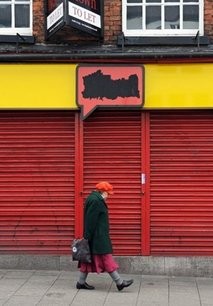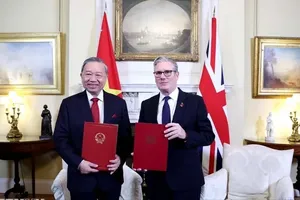
LONDON (AFP) – Britain's new coalition government is expected to unveil big cuts in public spending and significant tax increases in its first budget due Tuesday, after inheriting a record public deficit.
Chancellor of the Exchequer George Osborne will deliver the Conservative-Liberal Democrats' budget to parliament at 1130 GMT after the coalition took power following last month's general election.
Osborne confirmed Sunday that his emergency budget would include a levy on banks.
"What I'm determined to do is to make sure that the measures are tough but they're also fair," Osborne told BBC television.
"What we're clear about is that all parts of society are going to have to make a contribution."
Meanwhile, preparing millions of public sector workers for savage cuts, Prime Minister David Cameron said it was "fair" that they should face a squeeze on pay and pensions.
"There is no way of dealing with an 11 percent budget deficit just by hitting either the rich or the welfare scrounger," he said in a weekend interview with The Times newspaper.
Osborne was reportedly ready to announce a freeze in welfare benefit payments.
But the opposition Labour party, ousted at the May 6 general election after 13 years in power, warned moving too swiftly to make cuts could endanger a fragile economic recovery.
"We have to be very cautious about the rate at which money is taken out of the British economy," said the party's finance spokesman Alistair Darling.
Osborne is seeking to save tens of billions of pounds as state borrowing is forecast to reach 155 billion pounds (230 billion dollars, 185 billion euros), or 10.5 percent of gross domestic product (GDP), in the year to March 2011.
Britain's public deficit had rocketed to a record-high of 156 billion pounds in the 2009/10 fiscal year which ended in March, as severe recession hit tax revenues and as the government spent billions of pounds on bailing out banks.
Reports late Monday meanwhile said Osborne's announcement will include a sweetener in a bid to draw some of the poison from the toughest budget in decades, with the rate at which people start paying tax rising by 1,000 pounds.
The move, which was heavily trailed in the British media, will mean that nearly 900,000 people earning less than 7,475 pounds a year will pay no tax, said the BBC.
Deputy Prime Minister Nick Clegg warned in a message to his Liberal Democrat supporters the day before the budget that it would be "one of the hardest things we will ever have to do."
"But I assure you, the alternative is worse: rising debts, higher interest rates, less growth and fewer opportunities."
The government said last week that it had decided to axe or suspend projects planned by the former Labour government that would have cost about 11.0 billion pounds.
The coalition had already announced plans in May to cut spending by about 6.2 billion pounds in 2010/11.
Osborne is also expected to unveil tax increases in Tuesday's budget. Media reports suggest that he will raise VAT -- a tax on goods and services -- to 20 percent from 17.5.
The chancellor is also set to raise capital gains tax -- or profits from the sale of assets such as second homes -- and introduce a levy on banks.
Britain's economy is predicted to grow by only 2.6 percent in 2011 as it recovers from a record recession that ended late last year, according to the Office for Budgetary Responsibility (OBR), an independent fiscal watchdog set up by the new government.
That compared with a 3.25-percent expansion forecast by the previous Labour government.
























